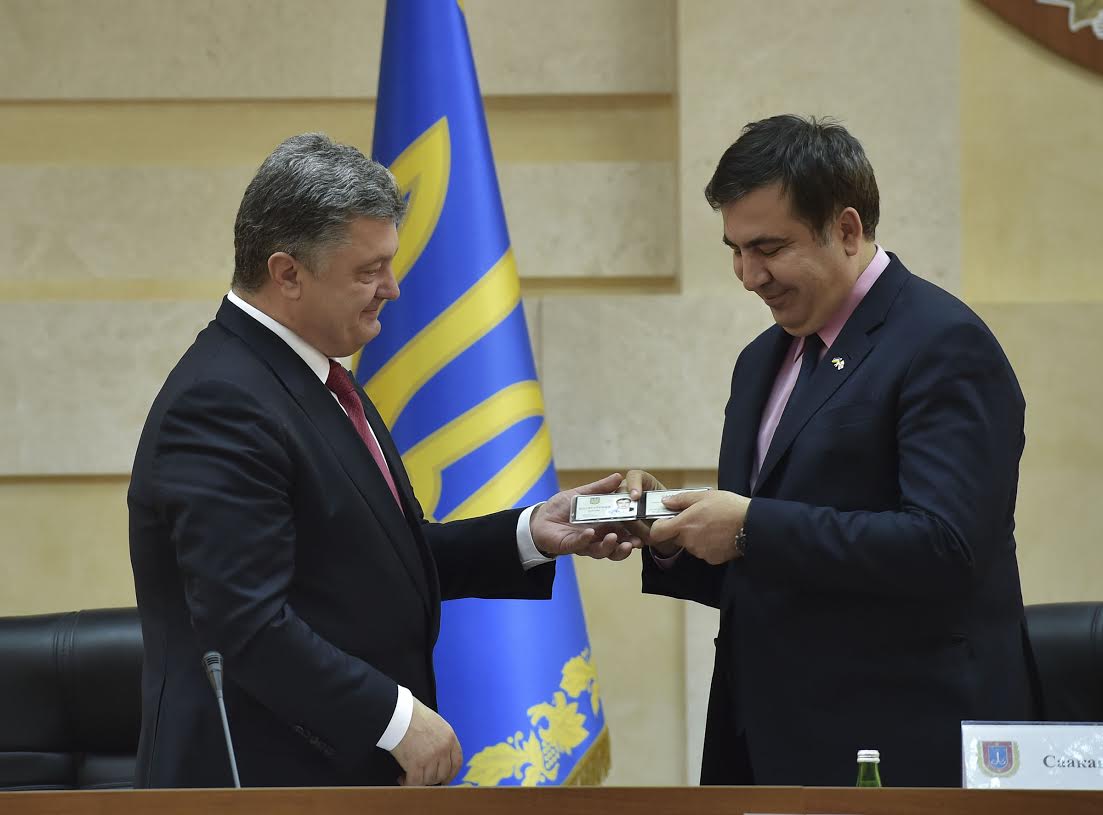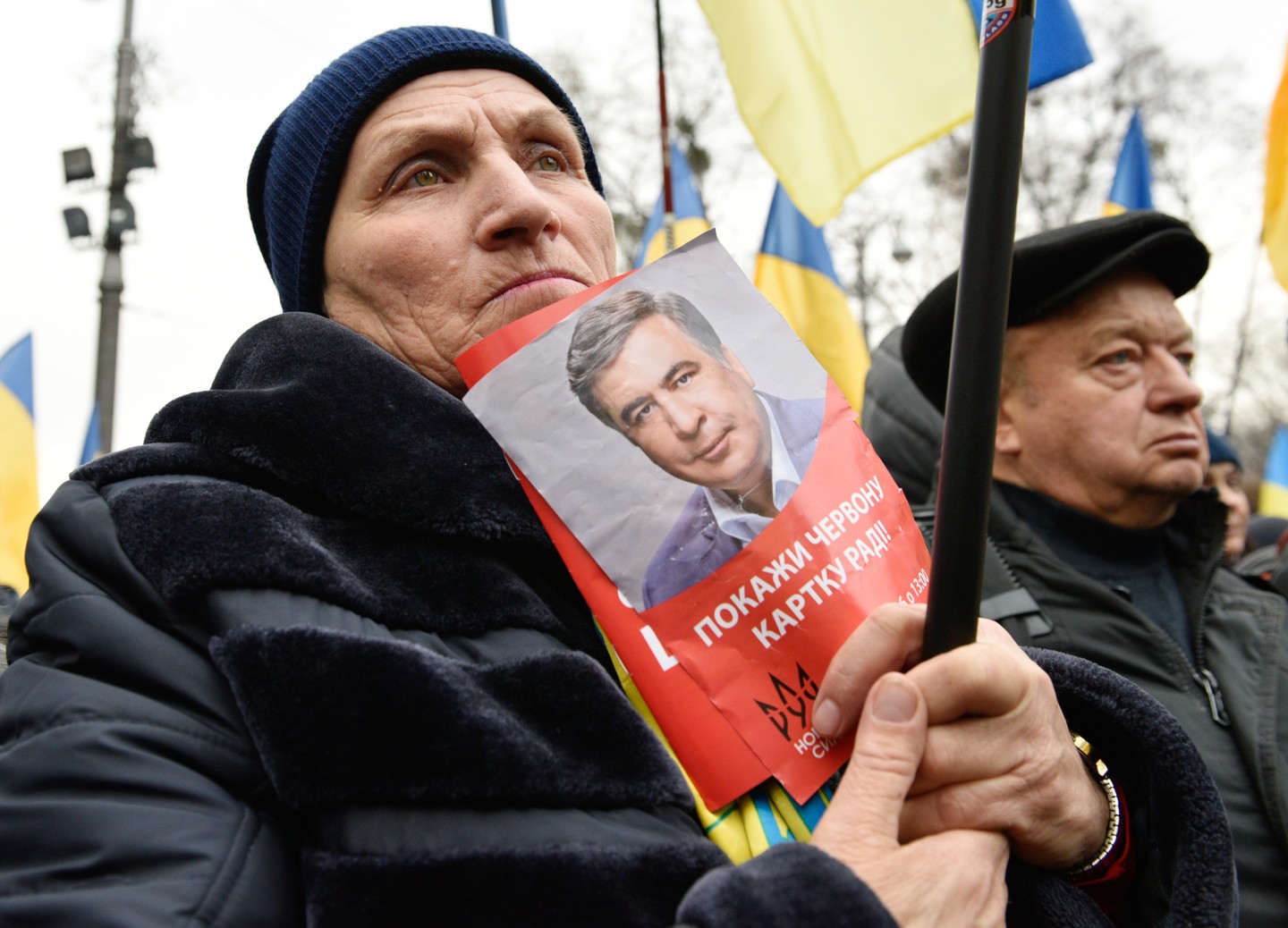Op-Ed: Saakashvili in Ukraine, the beginning of the end

Mikheil Saakashvili’s deprivation of Ukrainian citizenship was not unexpected, especially after the visit of the Ukrainian President to Tbilisi and his vague hints concerning the former president of Georgia.
Poroshenko’s decision has not only placed a full stop on the activities of Saakashvili in Ukraine, but it has finally closed the topic of the ‘Georgian reforms’. The method by which the Ukrainian president got rid of his opponent may seriously harm his personal reputation as well as that of Ukraine.
From advisor to the opposition
Back in December of 2013, I personally witnessed the popularity that Mikheil Saakashvili enjoyed among the participants of the Maydan protests. His speech on the stage was met with such enthusiasm that no other leader of Maydan could even compare.
And when Saakashvili descended from the stage and decided to go speak to the public, his popularity almost ‘cost me my ribs’: this was the pressure under which I had to work.
It is namely this popularity that, after the rise of Poroshenko to the presidency, led Saakashvili to be named his advisor. Members of his team were also placed in key positions in the government.
This is how Poroshenko showed Ukrainian society that he stood for the implementation of real reforms.
Why he made such a decision is understandable: the reforms undertaken by Saakashvili between 2004-2012 were more popular in Ukraine than they were in Georgia itself.
This was partially because of the PR campaigns of the former Georgian authorities, and partially because of Ukrainians who, having visited Georgia and returned home, were unable to hide their enthusiasm for what they saw.
The appointment of Saakashvili as Governor of the Odessa oblast (region) and granting him Ukrainian citizenship was viewed as a continuation of this policy. The hope appeared that Saakashvili would be given the ability to implement local, ‘pilot’ reforms in Odessa, which would then spread throughout Ukraine.
Looking back with what we know today, it would appear that it was this very step that was his biggest mistake: accepting a political position in the Ukraine has not only cost him his Georgian citizenship, but has also spelled the beginning of the end of his activities in Ukraine.
As Governor of the Odessa oblast, Saakashvili began to implement a slew of initiatives: the appointment of regional administrative heads by competition; streamlining the work of local customs; the firing of port managers; beginning the renovation and restoration of the strategically important road leading from Odessa to Reni; the disclosure of fraudulent land sales; supporting an initiative to introduce patrol police to the area and the opening of a center for administrative services (similar to the Georgian House of Justice).
Because of the resistance of local and central authorities in Ukraine, it was impossible for Saakashvili to entirely implement his reforms.
However, President Poroshenko was able to use the Odessa Governor to get rid of his political enemies, starting first with Igor Kolomoiski and later doing away with Premier Minister Arseniy Yatsenyuk. At that time, Saakashvili was forced to publicly support corrupted and odious politicians from the President’s team, which reflected negatively on his reputation.
 Photo:Ria Novosti
Photo:Ria Novosti
All of this ended in November of last year, when Saakashvili resigned from his position as Governor and openly entered into a conflict with President Poroshenko, accusing him of patronizing corruption. Saakashvili created his own party, ‘the Movement of New Forces’ (Rukh Novyxkh Sil) and came into direct conflict with the entirety of the Ukrainian political elite. However, in Ukraine, without money or media-resources it is almost impossible to achieve political success.
Saakashvili became a part-time TV president: until the end of June, he led programs on TV channel ZIK.
However, the situation changed. Saakashvili had lost the popularity he had in the days before he had become governor. This was achieved partially by pro-government propaganda in the mass media. For example, many in Ukraine believed that Saakashvili ‘is just a talker and doesn’t do anything’, with few realizing that the opportunity to do something had not been afforded to him. Another popular myth was the idea that it was Kakha Bendukidze who had led the reforms in Georgia, and that Saakashvili had been a sideline player.
These messages were rather successful and created favorable conditions for Poroshenko. For this reason, the President of Ukraine is probably not expecting any serious counter-actions in response from society or the opposition. Moreover, he chose the moment carefully – summer, the holiday season.
A Ukraine without Saakashvili
The first reaction of the majority of Ukrainian politicians and society was outrage: they compared the President of Ukraine with his predecessor, Viktor Yanukovych, who put his political opponent Yulia Tymoshenko in prison.
In the case of Saakashvili, the political motivation to deprive him of citizenship and the selective application of the law is so obvious and undeniable that it will obviously work against the reputation of Poroshenko and Ukraine as a democratic state.
In depriving Saakashvili of his citizenship, Poroshenko has put a full stop on the topic of ‘Georgian reforms’ and on all hopes that were tied to activities of the ‘Georgian team’.
The attempted reforms of the Georgian team were generally only partially implemented – many of them failed entirely. The efficacy of the new patrol and police force is low, given that it is still populated by many members of the old criminal police force and old cadres.
Courts are still largely corrupt and act against the interests of the state; it has even gotten to the point where they release arrested separatists and those accused of crimes against the state on bail. Attempts to reform the General Prosecutor’s office ended in complete failure.
According to international ratings, Ukraine is still the most corrupt state in all of Europe.
The fact that there were individual successes, including the creation of the National Anti-corruption Bureau, does not outweigh the hopeless and difficult situation – it is a fact that three years after Maydan, the same oligarchical situation remains as it was before the revolution.
The economy of the country, the media and political parties have all been divvied up among the oligarchs.
They see this well in the West. And Kiev constantly asks the West for help in its fight against Russian aggression. However, western partners have already, on several occasions, reminded Ukrainian authorities of the necessity of implementing reforms.
In the eyes of the West, the latest decision of President Poroshenko will probably be apprehended as just as shameful an event as the disappearance of the Azerbaijani journalist Afgan Mukhtarli from the center of Tbilisi, who later ended up in an Azerbaijani prison.
And for Ukrainian society, this will be a signal that the new authorities are not so different from the old ones: nothing is changing, and once again, the country is in the grip of selective justice and the rule of the oligarchs.
The dream of the ‘Dreamers’
The only side which is happy about this most recent development is the governing party of Georgia, ‘Georgian Dream’ and its informal leader, Bidzina Ivanishvili. Over the past few years, Saakashvili’s being in the Ukraine has been a major headache for the ‘Dream’, not only because Ukraine was not willing to have Saakashvili extradited; they probably didn’t even expect that.
The main problem was that the former President and members of his team had been accepted in another country with respect and honors and had even been appointed to certain positions. This was difficult to explain to Georgian Dream voters, as the ruling party had to prove that the reforms of Saakashvili had actually been nothing but fakery and bluffing, and that he had even managed to trick international ratings.
Saakashvili’s crossing over into the opposition of Ukraine got rid of this problem, and relations between Kiev and Tbilisi were restored, which was marked by Poroshenko’s visit to Tbilisi.
The dream of the Georgian authorities is to return Saakshvili to his homeland in handcuffs and to arrange a show trial.
However, Poroshenko, in order to improve relations with Tbilisi, limited himself to depriving Saakashvili of citizenship and his practical eviction from the country.
And so for now, the dream of the ‘Dream’ remains unfulfilled.



















